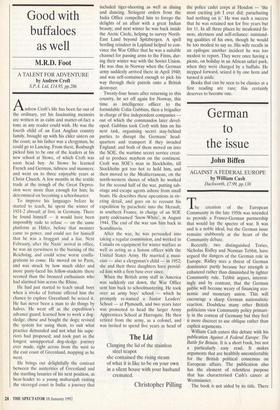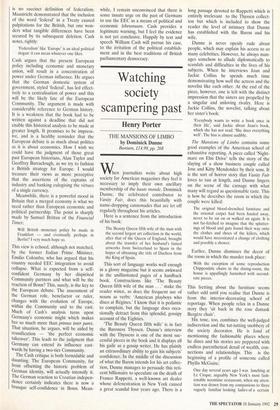German to the issue
John Biffen
AGAINST A FEDERAL EUROPE by William Cash Duckworth, £7.99, pp.138 The creation of the European Community in the late 1950s was intended to provide a Franco-German partnership that would lay the spectre of war. It was and is a noble ideal, but the German issue remains stubbornly at the heart of the Community debate.
Recently, two distinguished Tories, Nicholas Ridley and Norman Tebbit, have argued the dangers of the German role in Europe. Ridley sees a threat of German dominance partly because her strength is enhanced rather than diminished by tighter Community rule. Tebbit argues, interest- ingly and by contrast, that the German public will become weary of financing eco- nomic and monetary union. This will encourage a sharp German nationalistic reaction. Doubtless many other British politicians view Community policy primari- ly in the context of Germany but they feel it more discreet to use oblique rather than explicit arguments.
William Cash enters this debate with his publication Against A Federal Europe: The Battle for Britain. It is a short hook, but not a particularly easy read. It makes arguments that are healthily uncomfortable for the British political consensus on European affairs. The publication also has the element of relentless purpose that has characterised Cash's career at Westminster.
The book is not aided by its title. There is no succinct definition of federalism. Maastricht demonstrated that the inclusion of the word 'federal' in a Treaty caused palpitations for the British, but one won- ders what tangible differences have been secured by its subsequent deletion. Cash notes, rightly:
'Federalism' like 'Europe' is an ideal political slogan: it can mean whatever one likes.
Cash argues that the present European policy including economic and monetary union, will result in a concentration of power under German influence. He argues that the German domestic system of government, styled 'federal', has led effect- ively to a centralisation of power and this will be the likely fate of the European Community. The argument is made with considerable reference to German history. It is a weakness that the book had to be written against a deadline that did not enable this historical analysis to be made at greater length. It promises to be impress- ive, and is a healthy reminder that the European debate is as much about politics as it is about economics. How I wish we could have the judgment of those great past European historians, Alan Taylor and Geoffrey Barraclough, as we try to fashion a British strategy for Europe. I would treasure their views as more perceptive that the assertions of the captains of industry and banking eulogising the virtues of a single currency.
Meanwhile, there is a powerful mood in Britain that a merged economy is what we need rather than European economic and political partnership. The point is sharply made by Samuel Brittan of the Financial Times:
Will British monetary policy be made in Frankfurt — and eventually perhaps in Berlin? I very much hope so.
This view is echoed, although not matched, by the former Italian Prime Minister, Emilio Colombo, who has argued that his country needed EEC integration to avoid collapse. What is expected from a self- confident Germany by her dispirited Community partners and what will be the reaction of Bonn? This, surely, is the key to the European debate. The assessment of the German role, benefactor or ruler, changes with the evolution of Europe, within the Community and to the east. Much of Cash's analysis turns upon Germany's economic might which makes her so much more than primus inter pares. That situation, he argues, will be aided by reunification — 'the perfect economic takeover'. This leads to the judgment that Germany can extend its influence east- wards by having a two-tier Community.
The Cash critique is both formidable and daunting. The European Community, far from offsetting the historic problem of German identity, will actually intensify it. The German reaction to Croatian indepen- dence certainly indicates there is now a brusque self-confidence in Bonn. Mean- while, I remain unconvinced that there is some innate urge on the part of Germans to use the EEC as a means of political and economic lebensraum. Cash provides a legitimate warning, but I feel the evidence is not yet conclusive. Happily by text and speech William Cash will pursue his case, to the irritation of the political establish- ment and in the best traditions of British parliamentary democracy.



















































 Previous page
Previous page